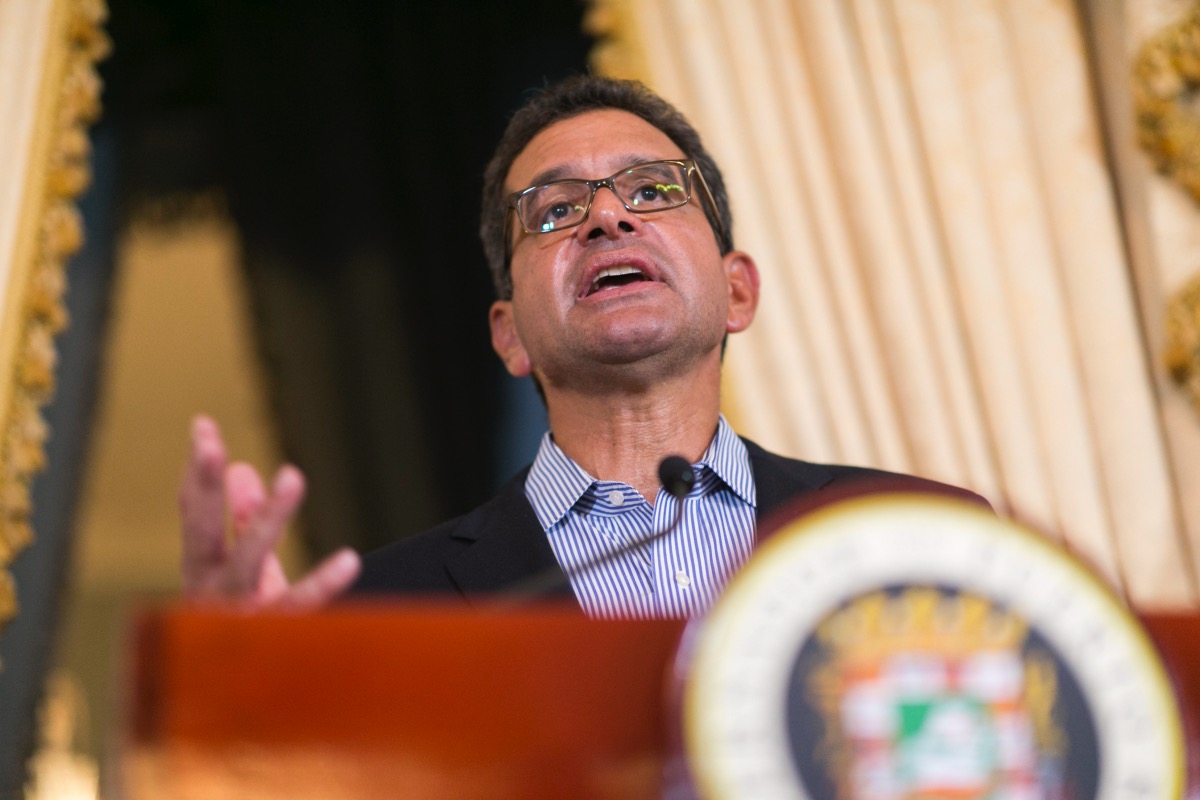

Puerto Rico’s Gov. Pedro Pierluisi speaks during a press conference at La Fortaleza in San Juan, Puerto Rico, on August 6, 2019. Pierluisi suggested that the new public-private alliance between the government and Genera PR to privatize the archipelago’s electrical generation could mean that customers will not see price increases. (AP Photo/Dennis M. Rivera Pichardo, File)
SAN JUAN — Puerto Rico could experience a spike in their electricity bills for the next 35 years if a debt restructuring proposal is accepted by a federal bankruptcy judge in New York.
The new plan filed Thursday by the Financial Oversight and Management Board for Puerto Rico (FOMBPR) would cut the defunct Puerto Rico Electric Power Authority’s (PREPA) more than $10 billion debt, the largest of any U.S. government agency, by “roughly half,” according to Board Chairman David Skeel.
The proposal has the support of three major creditors and is part of a third round of debt negotiations after previous attempts to restructure PREPA’s debt failed due to the interested parties being unable to reach an agreement.
If accepted, many Puerto Ricans would pay an average of $19 more on their electricity bills, according to Skeel—at a time when many are already struggling to pay for electricity amid persistent blackouts.
Previous proposals suggested a $21 increase, but the new $19 average for non-subsidized customers comes from a $13 flat connection fee, $0.75 per kilowatt-hour for the first 500 kilowatt-hours, and up to $0.03 per kilowatt-hour for anything past the first 500 kilowatt-hours.
The average residential customer in Puerto Rico uses between 500 and 600 kilowatt-hours per month, according to the FOMBPR.
“Almost half of PREPA’s roughly 1.4 million residential customers wouldn’t pay this legacy charge,” Skeel said in a video published on the FOMBPR’s YouTube page.
“All these increases in the price of electricity make rent go up, make apartments and food unaffordable,” Alondra Diaz Delgado, a former student at the University of Puerto Rico, told Latino Rebels.
Small businesses would pay a monthly connection fee of $16.25, small industrial companies would pay $20, and large businesses would pay $1,800, plus additional charges. These rates would be in place for the next 35 years, along with any other increases and decreases in the price of electricity.
The new “hybrid charge” could potentially raise the average electricity bill in Puerto Rico by 14 percent, according to PREPA.
The proposal still needs to be approved by bondholders and confirmed by Judge Laura Taylor Swain and the Puerto Rico Energy Bureau.
“The charge is painful and unfortunate, but it is inevitable, due to the rights that creditors have,” Skeel said.
Skeel, alongside the rest of the FOMBPR, believes that the plan could be confirmed by Judge Swain when it comes up for examination on February 28.
After the FOMBPR made its announcement, Gov. Pedro Pierluisi released a statement saying that the final charges fall under the purview of the PREB and that his administration has always held firm that repaying bondholders must be integrated into PREPA’s administrative costs.
Pierluisi also suggested that the new public-private alliance between the government and Genera PR to privatize the archipelago’s electrical generation could mean that customers will not see price increases.
Many Puerto Ricans are still clamoring for the debt to be independently audited, in hopes that it will be labeled odious and thereby leave bondholders —many of whom bought a piece of Puerto Rico’s debt for pennies on the dollar— holding the bag, thus freeing Puerto Ricans of any cost of living increases.
“The debt is not ours to pay. That debt is illegal that bond brokers issued knowing people could not pay it,” Juan Rosario Maldonado, a former representative for residential customers on PREPA’s board, told Latino Rebels at a protest demanding the debt be independently audited.
PREPA’s is the only debt that remains unresolved since Puerto Rico declared bankruptcy in 2015, when then-Gov. Alejandro García Padilla described the island’s more than $70 billion debt “not payable.” In 2017, the archipelago’s government formally filed for bankruptcy, the largest municipal bankruptcy in U.S. history.
***
Carlos Edill Berríos Polanco is the Caribbean correspondent for Latino Rebels, based in San Juan, Puerto Rico. Twitter: @Vaquero2XL



This is so abusive. Puerto Ricans should just refuse to pay & say, “we are not paying.”